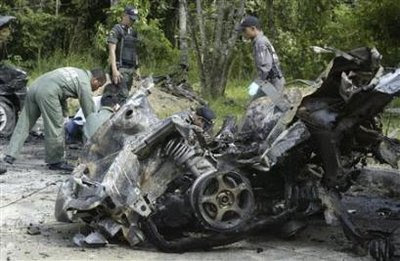The NationBANGKOK, Jan 24 — The Thai Foreign Ministry should be commended for making the problems in the deep South one of its top priorities.
Earlier this week, Foreign Minister Kasit Piromya led a high-level delegation of Thai ambassadors, and envoys from Indonesia, Malaysia, Singapore and Brunei, to Pattani, the heart of the Malay-speaking South, where he held meetings with a wide range of people.
Participants included students who receive grants and scholarships from the government, Islamic religious leaders, governors of the southernmost provinces and military top brass.
Kasit gave each group time to make its case, as well as letting them know the ministry’s concerns. Kasit reminded the officials assigned to the restive region that the entire world is watching, and stressed the need to be more sensitive with regards to cultural differences.
The international community has good intentions and the issue of human rights is one of its biggest concerns, he said.
He was correct to say that Thailand has an obligation to explain to the Thai people, as well as the international community, the progress the government has made in this trouble-plagued region, where more than 3,200 people have been killed since January 2004.
As a way to strengthen ties between the local community and the state, Kasit said budget allocations should be spread out to include local NGOs working at the community level. While it might not take a rocket scientist to figure out that that these ideas are good, Kasit and the ministry should not get caught up in a false sense of confidence. Good intentions are not policy. Tough decisions will have to be made if the problem in the deep South is to be resolved.
Like other ministries, Foreign Affairs will have to get the rest of the country to prepare for what could be a rough journey. As it stands, any move to accommodate the deep South will be costly in political terms.
The rest of the country will look at it as favouritism when, in fact, meaningful effort to improve the livelihood of the region is long overdue.
For too long the Muslim-majority region has been neglected in more ways than one. We know about the historical mistrust and we know that the Patani Malays have always questioned the legitimacy of Thai rule. But instead of trying to come to terms with the past and working towards improving the social mobility of the local Malays so they felt they had a stake in this country, the state repeatedly tampered with the issue of identity.
It was believed that, eventually, the Patani Malays would become “Thais” like the Chinese in Yaowarat or the Lao in Isaan. They were wrong. No matter how we look at this, tension in the South always comes back to the question of identity, the question of human dignity.
Like it or not, the Patani Malays have their own history, myths, heroes and legends, and these happen to be a completely different set of narratives from those of the Thai state.
In spite of the fact that armed separatist movements surface every generation or so, there is no overwhelming evidence to suggest that the local Muslims want to break away from Thailand. If anything, we believe that they want to be part of Thailand, but on their own terms.
Like others, Kasit needs to know that any move to accommodate the Patani Malays will not be easy. It is, indeed, hard for any Thai to swallow the notion that there are actually Thai citizens out there who refuse to come to terms with the ideologies that define what this nation-state is and should be.
For too long, the state has worked hard to mould the Patani Malays into something they are not and do not wish to be — at least to the point where they don't challenge the authority or question the legitimacy of the state.
But for the Patani Malays, this has been something they cannot compromise on, as Malay identity and Islam are inseparable. An attack on one is an attack on the other.
Historically, state officials, including aristocrats sent to the region over the past century, see themselves as benevolent rulers. A century after the region came under the direct rule of Bangkok, we continue to believe that sending good and honest officials to administer over the Malay-speaking region will help improve the situation.
Today, with a new generation of insurgents forming a web of cells in the region, we are still scratching our heads over what to do. For five years, the military-led initiatives have tried everything under the sun — both carrot and stick have been employed and yet the Patani Malays just won’t get in line.
We don’t seem to understand that, from the Malays’ perspective, a benevolent Siamese colonial master is still a Siamese colonial master.
This may be a bit hard for us to swallow, but many people in the three southernmost provinces actually see Thai officials and residents as foreign occupiers — which naturally makes the local people colonial subjects.
This is probably why extremely few local people have stepped forward to point the finger at suspected insurgents. They may not agree with the brutal methods employed by the insurgents but we can’t deny the fact that they share the same overall sentiment.
Perhaps it’s time to think outside the box. Perhaps we should start to look for ways to change the equation so that the Patani Malays feel they have a stake in this country, a shared destiny. Our initiative has to go beyond giving local Malay Muslims free trips to Bangkok and Chiang Mai to show them grand temples and whisper in their ears, “This is yours, too”.
Funny how none of these trips ever include a visit to the Praya Tani cannons in front of the Defence Ministry.
What would we say? “This used to be yours, but not anymore. Learn to live with it buddy; you are a defeated people?”




























